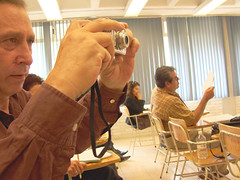 Ewan Mcintosh is continuing a conversation, apparently begun by Andy Gibson, at School of Everything. In A Teacher, by Any Other Name, Andy reported on a recent meeting about an online project they are developing, where they started questioning the use of the term teacher wondering that it might be considered a liability to the project.
Ewan Mcintosh is continuing a conversation, apparently begun by Andy Gibson, at School of Everything. In A Teacher, by Any Other Name, Andy reported on a recent meeting about an online project they are developing, where they started questioning the use of the term teacher wondering that it might be considered a liability to the project.
..it’s pretty clear from the general feedback that the word “teacher” also puts off many people with skills and experience to share.
Ewan suggests that,
As adults we rarely refer to those who teach us how to work better as ‘teacher’.
He continues that we have incorporated in our conversations, new words to label teachers, words that we hope re-image our notions of the job. We want to call ourselves mentor, coach, FACILITATOR
I would suggest that this is too easy. Language is useful. It helps us to form images, and sometimes, new images. But the word, teacher, is not the problem. It’s the cultural story that prevails and gets retold too often and in too many ways. We need to re-tell that story, and as we continue to talk about compelling new information and communication technologies and new information (literacy) skills involved in accessing, working, and expressing information (messages) more compellingly, perhaps we educators need to use the same tools and skills to retell our story.
Personally, I feel that the “us-and-them” aspect is still important in classrooms. It is perfectly alright and important for teachers to act like learners, and for learners to act like teachers. Part of teaching is learning, and visa-versa. Yet, authority continues to be an important component of classroom learning, even if the classroom is a Moodle interface. The point, from my perspective, is that the job of teaching has become much more complex and much more exciting in the past 25 years — and that’s the story we need to tell.
So, how about Teaching! in 30 Seconds. You may be aware of a number of contests that have emerged over recent years, most notably, MoveOn’s political commercial contests, and Lafayette, Louisiana’s community campaign to defeat local telco’s efforts to block community telecommunications initiatives.
What if someone (ISTE, ThinkQuest, etc.) were to organize a contest, asking schools to produce a 30 second commercial that compellingly illustrates what it is to be a 21st century teacher — honoring the traditional notion of expert conveyor of knowledge, but emphasizing all of the other activities that are necessary to being a successful educator today, planner, manager, collaborator, researcher, content developer, advocate, provocateur, master learner, to mention only a few.
We have to tools to do this. If we don’t have the skills, here’s a good way to develop them. [Image ((Alatorre, Israel. “Metafoto.” Israfel67’s Photostream. 29 Jun 2007. 16 May 2008 <http://flickr.com/photos/ixbarnix/662658636/>.))]
Just a thought!

Excellent post. This kind of “re-education” is crucial to ensure that teachers are promoting and applying the most innovative and creative lesson plans possible. A good example of an innovative program is Intel’s International Science & Engineering Fair (ISEF), that’s wrapping up in Atlanta today. ISEF has grown in size and prestige to become the crowning achievement in the U.S., and internationally, in high school science competitions, and is a true example of some of the exciting and potentially ground-breaking work that students – inspired by their teachers – can produce.
Hi David,
I have been reflecting on the 21st Century Educator, and many of the terms you have written in this blog to describe the 21st century teacher/educator fit with my thought to.
http://edorigami.wikispaces.com/21st+Century+Teacher
I believe the 21st Century Educator, is a learner (A 21st Century Learner), leader, adaptor, visionary, communicator, risk taker, collaborator and model.
The video competition looks like an interesting approach and I will follow this concept
I think you should pass this idea over to ‘Common Craft’ and see what they come up with … it would look great sitting alongside their Web 2.0 offerings!!
Hmmm! Interesting idea. I may do that…
When teachers and learners are co-engaged in learning, then the word teacher can be diminishing thanks to the old paradigm of teacher as ‘dispenser of knowledge’. I think the term ‘mentor’ is more appropriate to the vision of teacher as the more experienced ‘guide on the side’ or ‘leader of the expedition’.
Is the word ‘student’ in need of similar renovation?